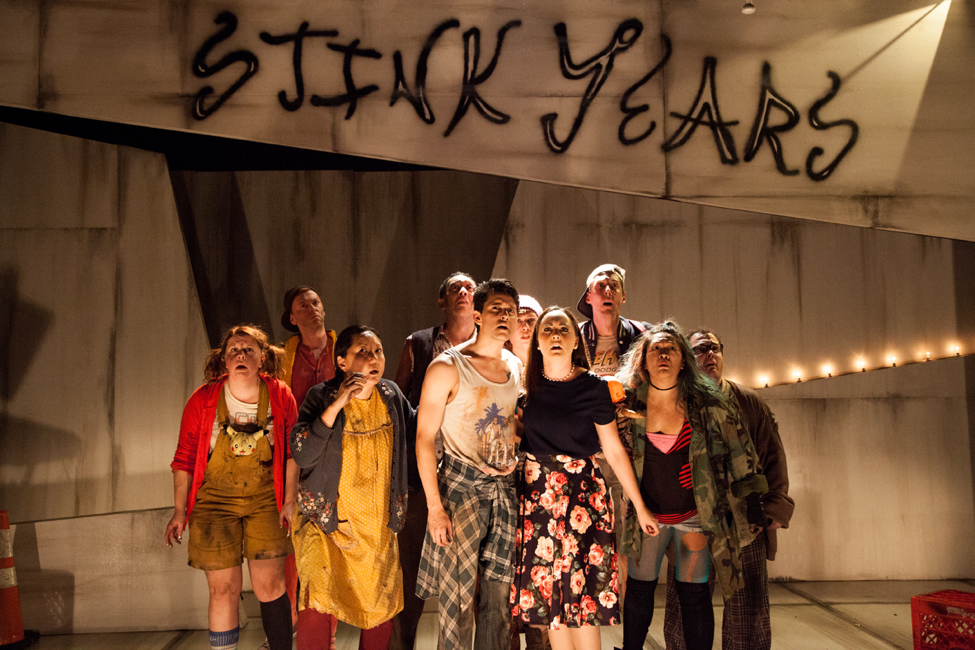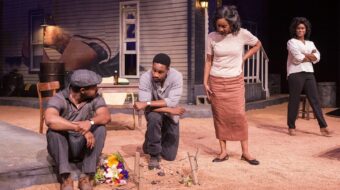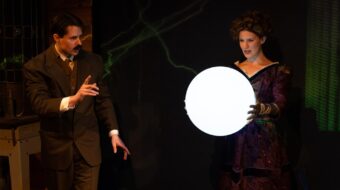
NORTH HOLLYWOOD, Calif. — Urinetown: The Musical is a wicked, irreverent satire with broadly drawn characters from the world of melodrama. It tells an earnest tale of love, greed, corruption and revolution set in a not so distant dystopian future.
A city is plagued by a 20-year drought. Water has become so scarce that private toilets are unthinkable. A privately owned firm called Urine Good Company, headed by the evil Caldwell B. Cladwell (Gary Lamb, who dresses nicely), has finagled a contract with the city, greased by plenty of cash going into the hands of the local politician Senator Fipp (Shakil Azizi), giving the company exclusive rights to run the public amenities which citizens have to pay a fee to use. As Cladwell likes to boast of having overcome the affliction of the awful Stink Years, “I kept the pee off the streets and the water in the ground.”
Holding a monopoly over the town’s most private and basic needs, the tyrannical corporation resembles all too closely those sweetheart arrangements that actually do exist in almost every country between the public and private sectors to control water, gas, electrical power, internet access, telephone service, fuel, rent, education, healthcare, banking, culture — one could go on and name virtually every necessity of life up to and including the very air we breathe. Police are there to enforce the law with violence and summary capital punishment if need be. (Even under socialism there has always been some degree of disconnect between the hegemony of the state and the needs of the people.)
According to the law of contradictions in society, through the determination of destitute (but uneducated and malleable) masses, a hero among them rises to lead his fellow citizens in rebellion. By the end, though the drought is not over, the waters are flowing and people can once again “Pee 4 Free,” as one demonstration picket sign reads. And then — dialectically — the need for some measures to manage the ongoing drought arises anew. Will the cycle of repression and liberty return, or is there some better way society can manage itself?
Urinetown: The Musical premiered in 2001, with a book by Greg Kotis, music by Mark Hollmann, and lyrics by both of them. That was the year that Dubya assumed the presidency, the year of the Twin Towers attack. It seems so long ago. And yet its thesis presents, in musical form, almost the entire point of Canadian author and social activist Naomi Klein’s era-defining book from 2007, The Shock Doctrine: The Rise of Disaster Capitalism. Point being that capitalism takes advantage of disaster and catastrophe (economic, climatic, etc.), with its rush of sudden needs and fears, to accomplish what otherwise would have been impossible through normal parliamentary means.
Could it be that she was inspired by an off-Broadway musical? The work did not go unnoticed: Nominated for 10 Tony Awards, Urinetown won three, for Best Book, Best Score, and Best Direction of a Musical. Fifteen years later, it remains topical in an overly familiar way.
Some critics have called Urinetown derivative, citing Marc Blitzstein’s The Cradle Will Rock as a precedent. Which was also called derivative, of Weill and Brecht’s Threepenny Opera. Which was in fact derivative of The Beggar’s Opera, written in 1728 by John Gay with music arranged by Johann Christoph Pepusch. Which in turn satirized Italian opera.
Suffice it to say, that the inspired Urinetown is well within that tradition of socially conscious works that dare to scream “Help!” when things look like they’re going from bad to worse. The main thing to consider is that Urinetown is not so much a specific place you can locate on a map anywhere. Rather, it’s a state of mind, a consciousness, a metaphysical understanding that there’s a class above you that is entitled to rule, deserves its privileges, is unassailable in its power, and that you, lowly slaves, serfs or proles, are fated to resign yourselves to surrender in fear because you are simply born losers.
Musically, the show is a compendium of genres, but a couple of notes bear mentioning. I had not remembered from seeing this work once before, how stunningly Hollmann writes for chorus. I could well imagine a powerful choral suite from Urinetown being performed by vocal ensembles as Les Mis has also been adapted. And in many places characters poke fun at the conventions and even the very idea of musicals, a self-referential gimmick I have noticed elsewhere, and now I wonder if Urinetown may have been in at the beginning. The culmination of freedom comes sung to an upbeat gospel number that calls to mind the spiritual “Wade in the Water,” not strangely for a work that is in fact about water.
Coeurage does a bang-up job with this piece. Kari Hayter directed, deftly deploying her substantial cast between the denizens of the town and the personnel of the company. Gregory Nabours is responsible for the musical direction. Both of them presumably had a hand in the excellent casting. Christopher M. Albrecht did the choreography, at one point getting his loyal company employees with gold top hats to strut and kick à la Chorus Line. The scenic design by Matt Scarpino is funky and urban. Peter Shannon at the keyboard paced the show splendidly.
Standouts among the hyperactive cast include, besides those named above, the two cops Lockstock (Ted Barton) and Barrel (Robert Collins), the young lovers, rebellion leader Bobby Strong (Daniel Bellusci) and Hope Cladwell (Ashley Kane), the company owner’s daughter who goes rogue and joins the people (had the authors studied Mao’s theory of all-class unity?) Also, Little Sally (Nicole Monet) as the girl who asks a lot of questions and is usually unsatisfied with the answers she gets, and the authoritarian pissoir gatekeeper Penelope Pennywise (Janna Cardia).
Urinetown is presented by the seven-years-running Coeurage Theatre Company, L.A.’s “Pay What You Want” ensemble. In keeping with the theme of the musical — but actually this is the year-round company philosophy — the ticket price is intentional. The company states: “Pay What You Can is based on a person’s ability to pay. Pay What You Want is based on a patron’s desire. It is a value placement as well as an economic decision, designed to eliminate cost as a factor in attending theatre. Each patron decides what a theatre experience is worth to him or her, and some decide it is worth more than they initially paid. For that reason, the box office is kept open during intermission and after performances.”
URINETOWN: THE MUSICAL plays through Dec. 3 on Thurs., Fri. and Sat. at 8 pm (no performance Thanksgiving Day), with an added performance Weds., Nov. 30 at 8 pm. The Lankershim Arts Center is located at 5108 Lankershim Blvd. in N. Hollywood 91601. For tickets contact www.coeurage.org/urinetown or (323) 944-2165.












Comments